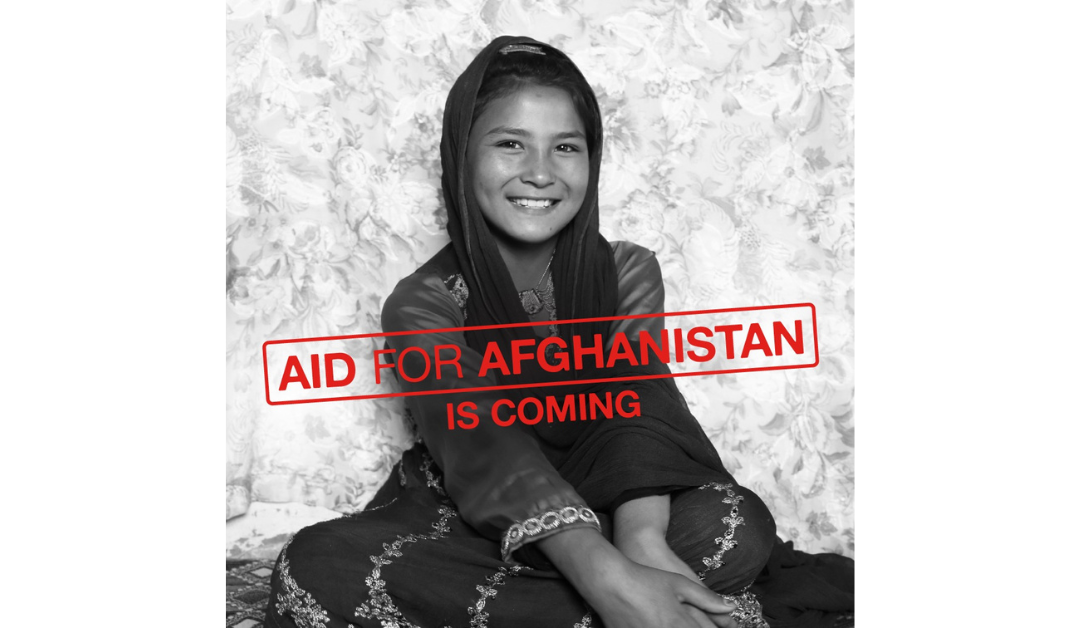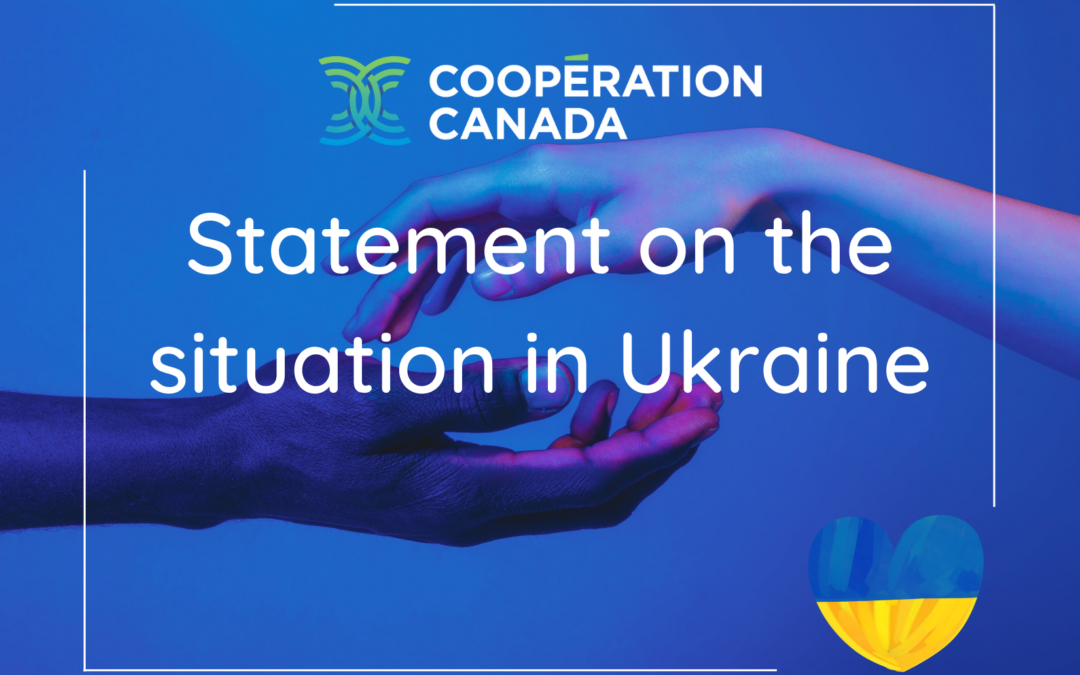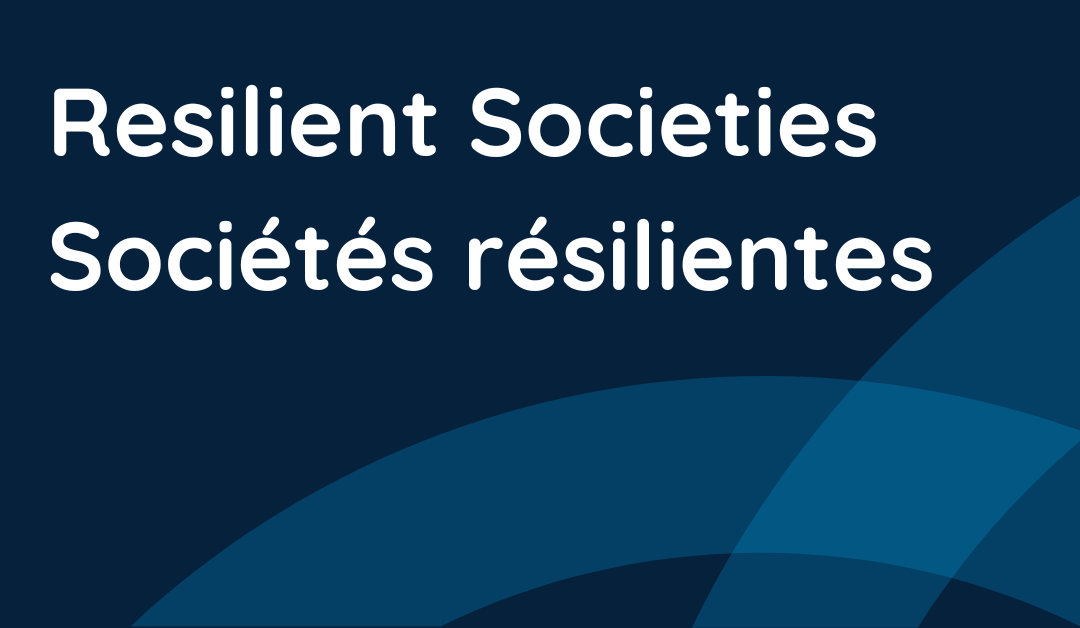
by Cooperation Canada | Nov 29, 2023 | Civil Society, News, Press Release, Resilient Societies
November 29, 2023, Ottawa – At a time when human rights and democracy are under threat in many parts of the world, Cooperation Canada is proud to participate in the launch of Resilient Societies, a new activist-led hub that provides support and creates spaces for human rights and democracy defenders, civil society activists and practitioners worldwide to unite, innovate and advocate. The launch will take place on November 30, 2023, at the Global Centre for Pluralism in Ottawa.
The launch event will raise awareness of the challenges and opportunities facing human rights defenders and civil society activists in countries with closed and repressive civic spaces, highlight strategic opportunities for collaboration and engagement between diaspora activists from closed and repressive spaces now based in Canada with others around the world, and present the vision, ambitions and priorities of Resilient Societies.
The launch will bring together leading figures in the field of human rights and democracy, including Maiwand Rahyab, a civic space expert from Afghanistan and the founder and CEO of Resilient Societies, and Muzna Dureid, a leading human rights activist from Syria. They are both now based in Canada.
“By fostering the resilience, agency and collaboration of democracy and human rights activists from closed and repressive spaces, including those now based in Canada, Resilient Societies ultimately seeks to contribute to creating open, resilient and vibrant civic spaces free of fear and repression”, said Maiwand Rahyab, Resilient Societies’ Founder and CEO.
Other guest speakers at the launch include Anita Vandenbeld, Parliamentary Secretary to the Minister of International Development, Ketty Nivyabandi, Secretary General of Amnesty International Canada, Meredith Preston McGhie, Secretary General at the Global Centre for Pluralism, Julie Delahanty, President of the International Development Research Centre, Tara Denham, Director-General of Human Rights, Freedoms and Inclusion at Global Affairs Canada, Chris Eaton, Executive Director of World University Service of Canada, and Kate Higgins, CEO at Cooperation Canada.
“At a time when human rights and civic space are threatened in so many parts of the world, Cooperation Canada is humbled to be playing a small role in the launch of this ambitious initiative”, said Kate Higgins, CEO of Cooperation Canada. “As a coalition of civil society organizations, we believe in the importance of supporting human rights, civic space and democracy, and are excited to support the important work of courageous activists in Canada and around the world”.
About Resilient Societies
Resilient Societies (RS) is an activist-led hub providing support and creating spaces for grassroots networks of human rights defenders and democracy and civil society activists and practitioners to unite, innovate, and advocate to address closing civic space. RS builds on Canada’s culture of embracing diversity and pluralism and its generosity in supporting and welcoming at-risk activists and translates it into organic, innovative, and activist-centered programs and projects that supports the work of activists-in-exile, and activists in repressed civic spaces. By building resilience, enhancing voice and agency, and raising the credibility and relevance of civil society activists and human rights defenders from closed and closing spaces, RS contributes to reversing the backsliding of democracy and shrinking civic space.
Resilient Societies is hosted by Cooperation Canada for its incubation period.
About Cooperation Canada
Cooperation Canada brings together Canada’s international development and humanitarian organizations and advocates for them by convening sector leaders, influencing policy and building capacity. Together, we work with partners both inside and outside Canada to build a world that’s fair, safe and sustainable for all.
Press contact
Gabriel Karasz-Perriau
Communications Manager
Cooperation Canada
(514) 945-0309
[email protected]
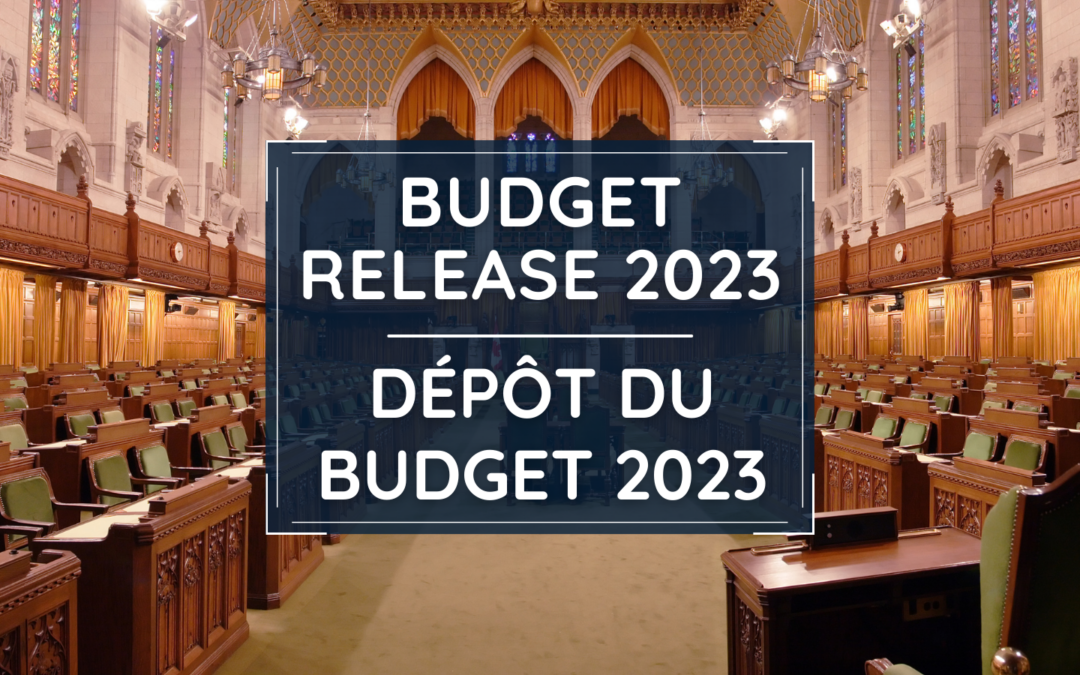
by Cooperation Canada | Mar 28, 2023 | Finance, News, Press Release
Ottawa – March 28, 2023: At a time of enormous need globally, the Canadian government has failed to deliver on its promise to increase foreign aid every year. As part of the Federal Budget 2023, the government declined to announce new investments for any international aid programs.
The coalition of 90 NGOs – representing a wide-range of development, humanitarian, environmental and advocacy groups – said that compared to Budget 2022, the overall international assistance funding was cut by no less than $1.3 billion – a 15% cut. The decision by the government to cut foreign aid comes amidst a world facing multiple crises around climate change, hunger, conflict and an erosion of human rights and democratic values.
“The word of the day is ‘undermine’,” said Kate Higgins, CEO of Cooperation Canada that represents over 95 organizations working on development and humanitarian assistance in countries around the world. “This budget undermines Canada’s standing in the world, it undermines progress on sustainable development, and it undermines our security. At a time when the world faces compounding global crises, Canadians expect their government to commit to bold global leadership. This budget does not deliver on this.”
In recent months, a sustained campaign by the international cooperation sector urged the government to prioritize funding commitments towards programs promoting gender equality, health, education, food security and nutrition, climate adaptation, and social justice.
In a letter to Finance Minister Chrystia Freeland in February 2023, more than 75 aid agencies emphasized the importance of foreign aid as a smart investment in global security and prosperity. They called on the government to commit to a predictable, three-year increase to reach $10 billion by 2025. Budget 2023 is lacking that clarity and predictability on how the government will be increasing its foreign aid envelope annually.
Elise Legault of the ONE Campaign added: “Canada has been there for Ukraine, but we are now letting other countries down. Canada’s commitments in today’s budget not only fail to meet this call but actively threaten progress as we know it. We made a promise to the world to increase international assistance every year, and instead there is a 15% cut in the middle of an unprecedented food crisis and countries crumbling under the effects of climate change. This isn’t the leadership that Canadians or the world expects.”
The coalition said they are hopeful that more funds will come later in the year, as this budget blatantly failed to announce new investments. For example, the government indicated its intentions to renew its historic investments for girls education globally made at the G7 in Charlevoix in 2018. Without that renewed investment, four million girls and young women around the world are left with an uncertain future as Canadian-supported education projects will end in the coming months.
“Canada has been a champion of women’s and girls’ rights, but the Feminist International Assistance Policy is an empty promise if Canada fails to back it with concrete actions and resources,” says Julia Anderson of CanWaCH, a coalition of organizations working on women’s and children’s health and rights. “At a time when the world is calling on Canada to step up and deliver on the vision and leadership it promised, this government chose to step down.”
Contact Information:
Louis Belanger – Bigger than our Borders – 613-265-4417
Sabrina Grover – One Campaign – 403-614-6498
Gabriel Karasz-Perriau – Cooperation Canada – 514-945-0309
Charmaine Crockett – CanWaCH – 613-863-9489
Note: The coalition of aid agencies represent a broad group of civil society organizations working in the field of advocacy, education, economic development, women and children’s health, sustainable livelihoods and food and water security, nutrition, gender equality and human rights. The group includes:
Action Canada for Sexual Health and Rights
Action Against Hunger
ACTED Canada
Alternatives
Adventist Development and Relief Agency (ADRA)
AidWatch Canada
Alberta Council for Global Cooperation
Atlantic Council for International Cooperation
Association québécoise des organismes de coopération internationale (AQOCI)
Bigger Than Our Borders
Bright Hope for Tomorrow
British Columbia Council for International Cooperation (BCCIC)
CAMFED Canada
Canadian Association for the Study of International Development (CASID)
Canadian Feed the Children
Canadian Foodgrains Bank
Canadian Lutheran World Relief
Canadian Network for Neglected Tropical Diseases
Canadian Partnership for Women and Children’s Health
Canadian Women for Women in Afghanistan
CARE Canada
Centre d’étude et de coopération internationale (CECI)
Children Believe
Coady Institute
CODE
Collaboration Santé International
Cooperation Canada
Cooperative Development Foundation of Canada
Crossroads International
Cuso International
Développement international Desjardins (DID)
Development and Peace-Caritas Canada
Dignity Network Canada
Egale Canada
Engineers Without Borders Canada
Equality Fund
Equitas – International Centre for Human Rights Education
Farm Radio International
Fondation Paul Gérin-Lajoie
Food for the Hungry Canada
Global Citizen
Global Disciples Canada
Grandmothers Advocacy Network
Health Partners International Canada
Human Concern International
Humanité & Inclusion
Hungry For Life International
iDE Canada
Inter Pares
International Council of AIDS Service Organizations (ICASO)
International Teams Canada
Islamic Relief Canada
Jane Goodall Institute of Canada
Journalists for Human Rights (JHR)
KAIROS Canada
Kentro Christian Network
Lawyers Without Borders CanaAda
Manitoba Council for International Cooperation
Mary’s Meals Canada
Médecins du Monde Canada
Medical Herstory
Mennonite Central Committee Canada
Mennonite Economic Development Associates (MEDA)
Mission inclusion
Never Again International – Canada
Northern Council for Global Cooperation
ONE Canada
Ontario Council for International Cooperation
Opportunity International Canada
Oxfam Canada
Oxfam-Québec
Partners In Health Canada
Penny Appeal Canada
Plan International Canada
Presbyterian World Service & Development
Primate’s World Relief and Development Fund
Public Service Alliance of Canada- Alliance de la Fonction publique du Canada
RÉFIPS, région des Amériques
Right To Play International
Results Canada
Salanga
Santé Monde
Saskatchewan Council for International Cooperation
Save the Children
SeedChange
Seva Canada
SOCODEVI
SOS Children’s Villages Canada
SUCO
Tearfund Canada
The United Church of Canada
Unité de santé internationale de l’Université de Montréal
UPA Développement international
Veterinarians without Borders Canada
VIDEA
WaterAid Canada
War Child Canada
The Wellspring Foundation for Education
World Accord
World Hope International (Canada)
World Renew
World Wide Hearing
World University Service of Canada
World Vision Canada

by Cooperation Canada | Oct 12, 2022 | export, News, Press Release
Wednesday, October 12th 2022 (Ottawa) – Cooperation Canada is excited to host the International Cooperation Futures Festival at the Shaw Centre, located on the unceded and unsurrendered territory of the Anishinaabe Algonquin Nation, colonially known as Ottawa, Canada, from 17th to 20th October 2022.
The festival will bring together over 300 change-makers from Canada and the world to examine the trends and disruptors that are shaping the future of international cooperation. Sessions will cover the future of the humanitarian system, the global hunger crisis, intersectional feminism, climate justice, decolonizing development, democracy, human rights and innovative finance.
At a time when collision of COVID-19, conflict and climate crises has set the world back decades on poverty, Russia’s war on Ukraine has led to massive movements of people, the world faces a global hunger crisis, and there’s a resurgence of anti-democratic and anti-rights forces around the world, these conversations are more important than ever.
Speakers and participants will come from civil society, government, parliament, academia, business and philanthropy.
The Festival at a Glance
The International Cooperation Futures Festival will be an in-person conference. Kate Higgins, Cooperation Canada’s CEO, explains:
“We heard from our members, government officials, civil society partners and others in the international cooperation ecosystem that there is a strong desire to come together in person – to reconnect, unlearn, envision and engage on the future of international cooperation. We are excited to welcome hundreds of people to this festival, to engage with new ideas, make new connections, and reflect on the collective action we need to take to realize a fairer, safer and more sustainable world.”
The festival will feature plenaries, interactive sessions, and networking experiences. World-leading social activists, analysts, journalists and decision-makers will attend the festival.
Here are some of the festival’s highlights:
- The Walrus Talks public event and reception on the global hunger crisis at the National Gallery of Canada, featuring: Rachel Blais, Executive Director, Qajuqturvik Community Food Centre; Sophie Gebreyes, Country Director, Ethiopia, World Lutheran Federation; Marcel Groleau, President, UPA Développement international; Neil Hetherington, Chief Executive Officer, Daily Bread Food Bank; Jean-Charles Le Vallée, Country Representative – Canada, Inter-American Institute for Cooperation on Agriculture; and Melana Roberts, Chair, Food Secure Canada. This is a joint event co-organized by The Walrus, Canadian Foodgrains Bank, World Vision Canada, World Food Programme, and Cooperation Canada.
- High-level plenary session on trends and disruptors shaping international cooperation, with: Katelynne Herchak, Manager – Indigenous Governance & Decolonial Practice and Policy, head of VIDEA’s Arctic Gender Policy programme; Ketty Nivyabandi, Secretary General, Amnesty International Canada; Dorothy Nyambi, President/CEO, MEDA; Magalie Noel Dresse, Co-President, Centre for Haitian Excellence; and Sara Pantuliano, Chief Executive, ODI. The session will be moderated by prominent Canadian Radio-Canada journalist Sophie Langlois.
- High-level plenary session on imagining the future of international cooperation featuring: Françoise Moudouthe, CEO, African Women’s Development Fund (virtual, in French); Heba Aly, CEO, New Humanitarian; Rasha Sharma, Founder, Peace Track Initiative; Bryanna Brown, Indigenous land and climate activist; Joseph Messinga Nkonga, Permanent Secretary – Fierté Afrique Francophone (in French). This session will be moderated by Jean Lebel, President of the International Development Research Centre.
- A conversation with the Minister of International Development, the Honorable Harjit Sajjan, with Rabi Adamu Musa, Founder, Mcrissar Foundation for Women and Girls – Nigeria; and Odette McCarthy, Executive Director, Equitas/Co-Chair of Board of Directors, Cooperation Canada. The session will be moderated by Afghan journalist in exile in Canada, Lotfullah Najafizada, CEO, AMU TV.
- Many more speakers and activities are featured. Check out the program here.
About Cooperation Canada
Cooperation Canada brings together Canada’s international development and humanitarian organizations and advocates for them by convening sector leaders, influencing policy and building capacity. Together, we work with partners both inside and outside Canada to build a world that’s fair, safe, and sustainable for all.
Press contact
Gabriel Karasz-Perriau
Communications Manager
Cooperation Canada
[email protected]
(514) 945-0309
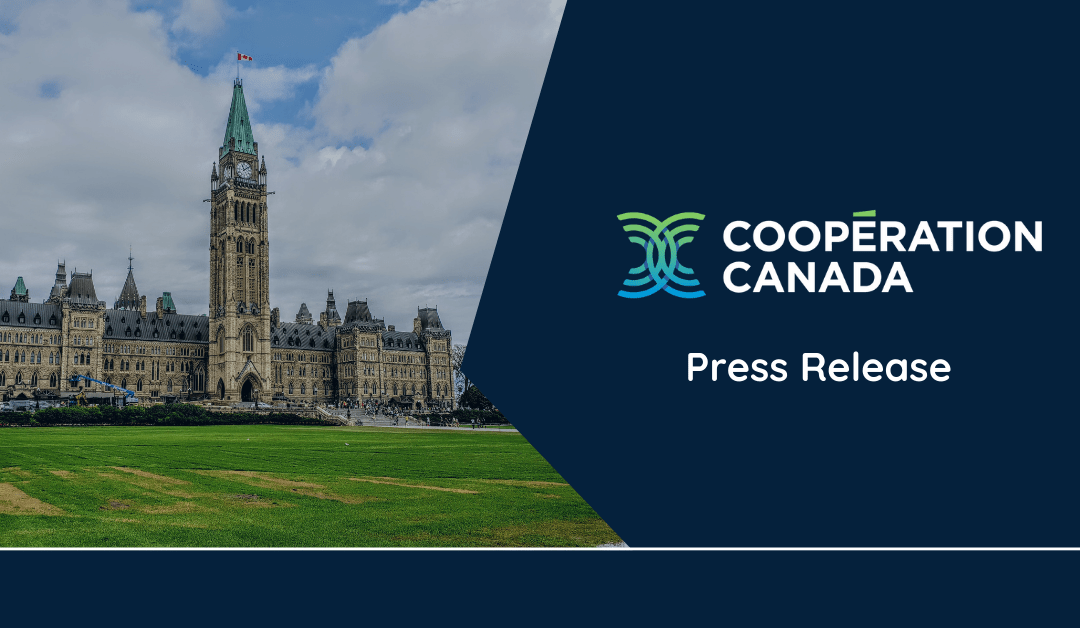
by Cooperation Canada | May 30, 2022 | News, Press Release
May 30th, 2022 (Ottawa) – Cooperation Canada, along with 70 Canadian humanitarian and international development organizations, urges the Government of Canada to amend the Budget Implementation Act (BIA) to reflect the spirit of Bill S-216, the Effective and Accountable Charities Act. Changes to Canada’s charity regime proposed in the BIA released in April 2022 accentuate colonial and paternalistic relationships between charities and the partners that support their charitable objectives, both in Canada and internationally.
Initially encouraged by Canada’s commitment in the 2022 federal budget to implement the spirit of Bill S-216, many Canadian charities are disappointed with what is proposed in the BIA.
“Canada’s charity regime is outdated, colonial and patriarchal. It needs to change so charities can better support the organizations and movements responding to conflict and crisis, fighting for justice and human rights and investing in sustainable development around the world. We want to shift power and resources to the communities at the forefront of driving change, and need a charity regime that supports this”, explains Kate Higgins, Cooperation Canada’s CEO. “We welcome the government’s openness to dialogue to address our concerns”, added Higgins.
Charities are concerned about integrity and want to preserve public trust. They are committed to the utmost accountability. But signatories to this letter are concerned that the BIA will make it more difficult for organizations to achieve their charitable purposes by inserting into the legislation a rigid and prescriptive approach to funding non-charities. The new rules proposed in the BIA allowing charities to make ‘qualifying disbursements’ or grants to non-qualified donees make the system more confusing, risky and difficult for registered charities and non-charities to work together and, as a result, may prevent philanthropic and charitable resources from flowing to the communities that need them most.
Cooperation Canada called on its civil society partners to sign an open letter calling on the Government of Canada to make immediate changes to the BIA. The changes proposed in the letter would increase the opportunities for partnerships between equity-seeking organizations and Canadian charities here in Canada and around the world, placing more resources in the hands of local partners so charitable funds can have the greatest possible impact.
“We need to fix the Budget Implementation Act and modernize Canada’s charity regime so we can unlock more resources and localize and decolonize our work with communities in Canada and around the globe”, said Carelle Mang-Benza, Cooperation Canada’s Policy Lead.
About Cooperation Canada
Cooperation Canada brings together Canada’s international development and humanitarian organizations and advocates for them by convening sector leaders, influencing policy and building capacity. Together, we work with partners both inside and outside Canada to build a world that’s fair, safe and sustainable for all.
Press Contact
Gabriel Karasz-Perriau
Communications Manager
Cooperation Canada
[email protected]
(514) 945-0309



